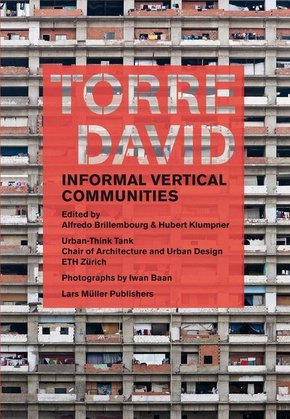Torre David - Informal Vertical Communities
| Verlag | Lars Müller Publishers |
| Auflage | 2014 |
| Seiten | 416 |
| Format | 24 cm |
| Gewicht | 1350 g |
| Artikeltyp | Englisches Buch |
| ISBN-10 | 3037782986 |
| EAN | 9783037782989 |
| Bestell-Nr | 03778298A |
Torre David ist ein 45-stöckiger Wolkenkratzer in Caracas, der aufgrund der Wirtschaftskrise in Venezuela 1994 nie zu Ende gebaut wurde. Heute ist er das improvisierte Zuhause von mehr als 750 Familien, die ohne offizielle Genehmigung in diesembesetzten Raum leben, der von manchen als 'vertikaler Slum' bezeichnet wird.Urban-Think Tank, die Autoren von "Torre David: Informal Vertical Communities", haben ein Jahr lang die räumliche und soziale Organisation des Ortes untersucht. Anhand zahlreicher Fotografien von Iwan Baan dokumentiert dieses Buch, wie dieMenschen hier leben und ihre Infrastruktur selbst organisieren, von Friseursalons und einem Fitnessstudio zu Lebensmittelläden und weiteren Einrichtungen des täglichen Bedarfs. Dieses zum Nachdenken anregende Buch zeigt die informellen Gemeinschaften des Hochhauses und die Architektur, in der sie leben. Die Autoren möchten Denkanstösse bieten, informelle Gemeinschaften als Orte zu sehen, die Innovationen und neueIdeen generieren - i m Dienst einer gerechteren und nachhaltigeren Zukunft.
Torre David, a 45-story skyscraper in Caracas, has remained uncompleted since the Venezuelan economy collapsed in 1994. Between 2007 and 2014, it became the improvised home to more than 750 families living in an extra-legal and tenuous squat, that some have called a "vertical slum."Urban-Think Tank, the authors of Torre David: Informal Vertical Communities, spent a year studying the physical and social organization of this ruin-become home. Richly illustrated with photographs by Iwan Baan, the book documents the residents' occupation of the tower and how, in the absence of formal infrastructure, they organize themselves to provide for daily needs, with a hair salon, a gym, grocery shops, and more. The authors of this thought-provoking work investigate informal vertical communities and the architecture that supports them and issue a call for action: to see in informal settlements a potential for innovation and experimentation, with the goal of putting design in service to a more eq uitable and sustainable future.

